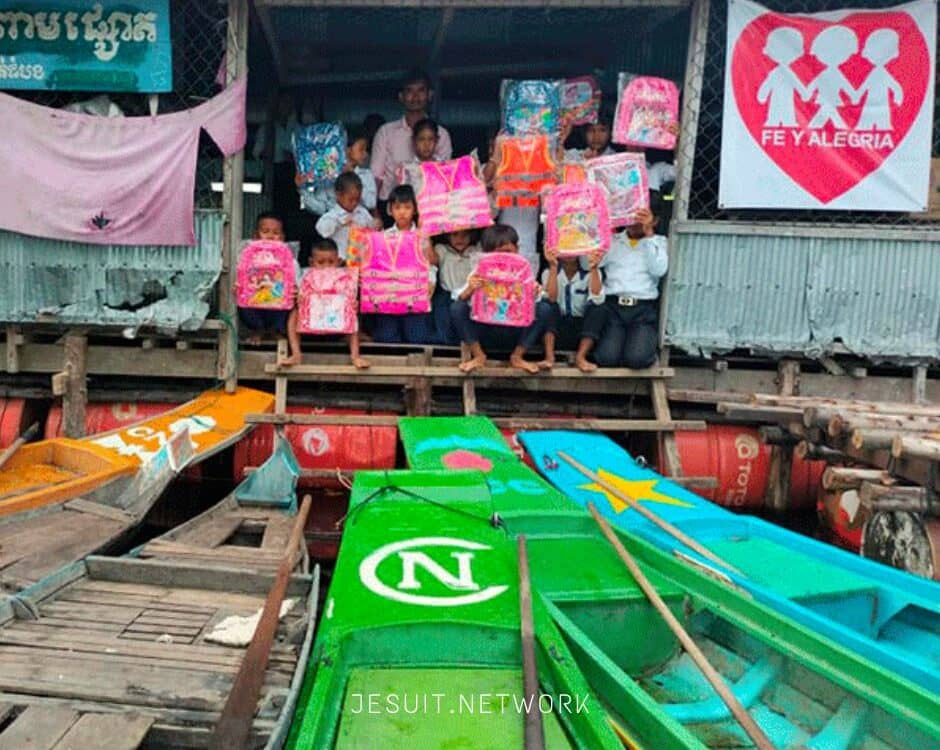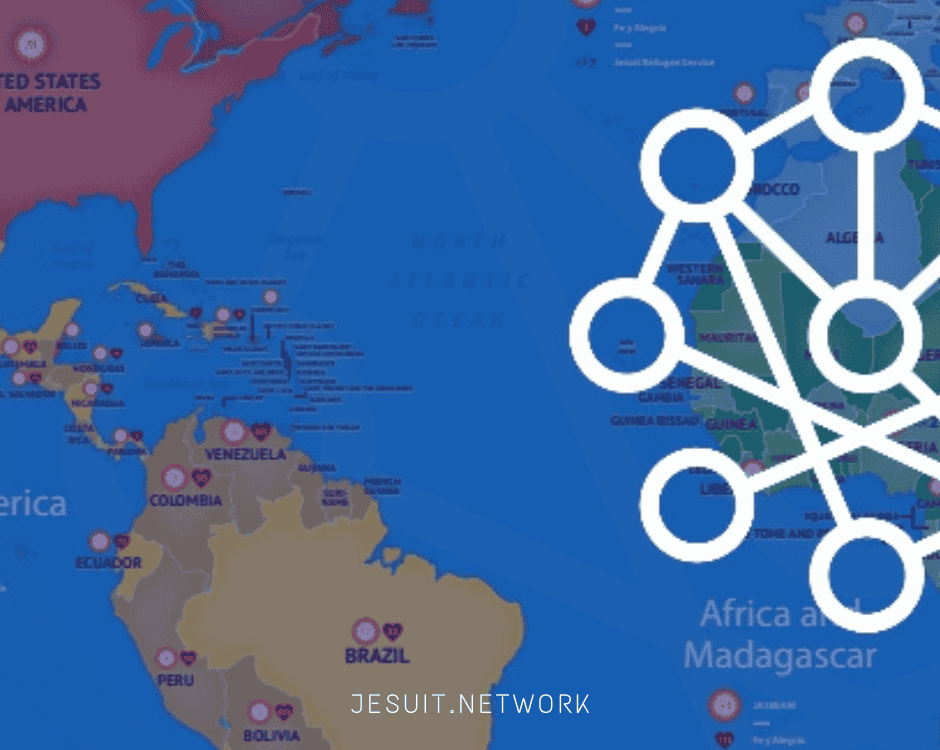This website uses cookies so that we can provide you with the best user experience possible. Cookie information is stored in your browser and performs functions such as recognising you when you return to our website and helping our team to understand which sections of the website you find most interesting and useful.
Jesuit Worldwide Learning, Education as a source of Hope
Last year, the number of Jesuit Worldwide Learning students rose to over 7,500 young people worldwide. In an interview, President Fr Peter Balleis SJ looks at the rapid development and the goals for 2023.
Fr Balleis, what is the idea behind Jesuit Worldwide Learning (JWL)?
Peter Balleis SJ: Jesuit Worldwide Learning enables young people living in marginalised communities to receive a university education. To this end, JWL has developed a blended learning model in collaboration with accrediting universities. Through shared global learning, JWL aims to contribute to a social-ecological transformation.
You have been working in Africa, Asia, Latin America and the Middle East for more than ten years. How has JWL developed during this period?
 I was involved in international refugee work ten years ago. That was when the initiative that led to Jesuit Worldwide Learning as a work of the Central European Province of the Jesuits was born. With the idea of providing online university education for refugees, we were pioneers in Kakuma Camp in Kenya and Dzaleka Camp in Malawi. In the meantime, the idea has grown into an innovative model. Since 2016, the number of students has increased from just under 200 to over 7,000. The number of partner universities and local partners is also growing. We face many challenges in the world. Education, as JWL facilitates, can be a help and above all a source of hope for marginalised youth.
I was involved in international refugee work ten years ago. That was when the initiative that led to Jesuit Worldwide Learning as a work of the Central European Province of the Jesuits was born. With the idea of providing online university education for refugees, we were pioneers in Kakuma Camp in Kenya and Dzaleka Camp in Malawi. In the meantime, the idea has grown into an innovative model. Since 2016, the number of students has increased from just under 200 to over 7,000. The number of partner universities and local partners is also growing. We face many challenges in the world. Education, as JWL facilitates, can be a help and above all a source of hope for marginalised youth.
In 2020, JWL started working with indigenous populations in the Amazon. With what offers are you on the ground?
We received a request from the St. Ignatius Mission in Lethem, Guyana, to work with the Wapashani people on the border with Brazil. This was followed by a visit and the setting up of a learning centre. The young people are already learning English, but not enough to study at the only university in faraway Georgetown. In addition, families lack money and the young people prefer to live in the Wapashani community rather than be lost at university in the big city. There are two programmes to help the young people get ahead. With JWL’s Global English Language Programme, they bring their language skills up to the required level. Also, as there are no trained teachers and secondary school leavers teach untrained before they get a place in teacher training, the 6-month Learning Facilitator teacher course is in great demand and a great help to the schools. This course is accredited by the Catholic University of Eichstätt-Ingolstadt. In three years, almost 50 young people have already studied with KU. One young Wapashani is already in his third and final year studying for a Bachelor’s degree in Sustainable Development.
How do young people in marginalised communities learn about the YWL programme?
Local partners are crucial to the JWL model, be it the Jesuit parish in the case of Guyana, the Jesuit Refugee Service JRS in the refugee context, Fe y Alegria in Ecuador or Jesuit Provincial institutions working with the marginalised youth and being with the poor. The Community Learning Centre is where youth learn about JWL, where they find internet, computers and guidance from facilitators. Youth hear about the programme and apply through the centre. The shared learning group contributes to success and also changes lives in the village or refugee camp.
Why JWL has started a preparatory programme in Science, Technology and Mathematics, the so-called Pre-STEM programme in autumn 2022?
JWL has offered a very successful one-year humanistic undergraduate programme – Liberal Studies – for over ten years. The undergraduate programme lays the academic foundation for the bachelor’s degree that follows, encourages young people to think openly and critically, and inspires them to see themselves as responsible individuals – Servant Leaders – in their communities. But we find that because of poor schooling, the poor do not make the leap into science despite their talent. Our goal is to offer a bachelor’s degree in science. The first step towards this is to orientate the basic humanistic studies with courses in algebra, physics, statistics and astronomy towards the natural sciences. The young people can discover their talent, interest and passion and then start the bachelor’s degree.
What role does Ignatian pedagogy play in JWL programmes?
The vast majority of JWL students are not Christian, many are Muslim, Hindu, Buddhist, Yezidi. They all know that JWL is a Christian-inspired and Jesuit-supported organisation. The Taliban in Afghanistan also know this. But it doesn’t matter, because we don’t teach Christian religion. Ignatian pedagogy is not an instrument of preaching the faith, but a pedagogy inspired by the Christian image of man and the experiences of spiritual exercises. The online courses are structured according to the learning and teaching steps of Ignatian pedagogy, with a view to context, analysis, reflection leading to action and evaluation. The experience of various forms of online learning and teaching has shown that important elements of Ignatian pedagogy in the structure of the courses and the accompanying facilitation are crucial for success. It is not the technology, but the pedagogy.
In many regions, access to education is difficult, even risky, for women. What is JWL doing to promote inclusion?
Globally, of the 7,662 students last year, 54 per cent were female. JWL is already very inclusive. The percentage of women is over 60 per cent in Islamic countries, especially in Afghanistan, although the opposite is expected here in particular. This has to do with the fact that JWL offers programmes in regions of the world where women tend to be disadvantaged or excluded in education. JWL technology with online and offline learning enables young women in Afghanistan to organise themselves into home study groups. They have everything on their laptops and only need the internet to upload homework. Technology helps to break the barriers for women. It allows study below the ‘radar of government controls’ as in Myanmar.
In Africa, on the other hand, there is the challenge of the proportion of women dwindling below 50 per cent the longer and more academic the programme. This apparently has to do with the culture in African countries like South Sudan, where fewer girls complete secondary school and apply to JWL. In the refugee camps of Kakuma in Kenya and Dzaleka in Malawi, our local team offers special English programmes for the girls to encourage them to study with JWL.
Looking back, what will you remember in 2022?
Visiting Ecuador, specifically the Dicaro village of the Waorani Nation in the Yasuni National Park in the Amazon. It is the area with the highest biodiversity in the Amazon – and probably even worldwide. The Waorani people have 600 members. But their importance is many times greater. They are the guardians of this area. To our surprise, experts from the Research Centre of the Catholic University of Ecuador told us that it makes sense for the young Waorani to learn English so that they can speak and be heard on an international level. The JWL English programme has already started. JWL has become a strategic partner of the new Programa Universitario Amazonico (PUAM), which aims to apply the JWL learning model of blended learning and Ignatian pedagogy to fulfil the mandate of the Amazon Synod of 2019 and provide university education for indigenous peoples in the Amazon.
JWL is committed to social-ecological transformation. What does this mean in concrete terms?
Engaging in the Amazon and working with PUAM and indigenous peoples in the Amazon is JWL’s contribution to a social-ecological transformation that has an impact beyond the Amazon. The Bachelor in Sustainable Development is JWL’s first Bachelor programme, created in collaboration with Xavier University in Bhubaneswar, India (XIMU). There are already 200 students enrolled. The first will receive their Bachelor’s degree at the end of 2023. Educating young people in the remote regions of the world, in the rainforests and areas where climate change is having a devastating impact, is a focus of JWL. Another programme in agroecology with Father Claus Recktenwald in Zambia is being planned.
What are your goals for 2023?
The DNA of JWL is to develop a model that is scalable, transferable and sustainable. This means that JWL has a growth momentum that builds on demand from partners and especially JWL grads working with marginalised communities. In 2023, I will visit East Timor because there is a need for English in schools there. A teacher training institute of sisters is already working locally with our English programme. Other goals are to increase the involvement of JWL as a work of the Central European Province in the networks of the Society of Jesus, in strategic partnerships with the Jesuits in South Asia and with the Amazon programme. We want to further develop JWL as a global alliance of many universities, partners and supporters to enable more young people on the margins of this world to access university education.
Interview Céline Fossati for Jesuit News from Europe





